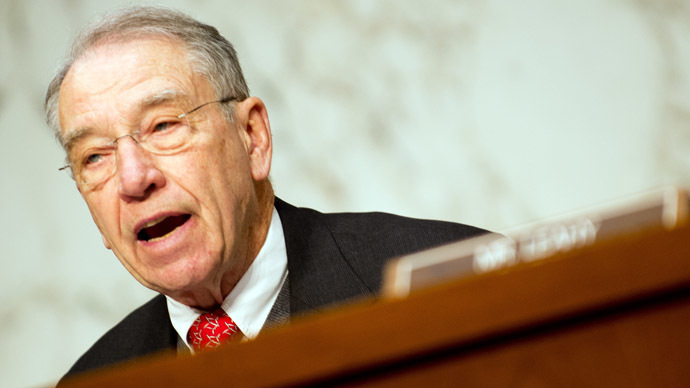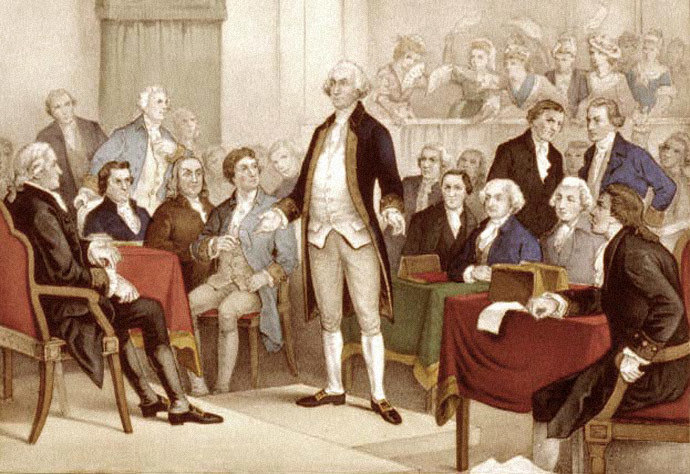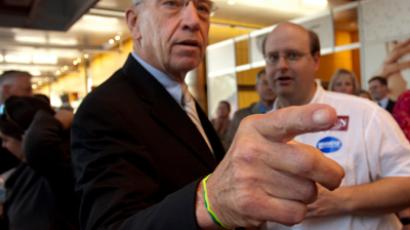Senator proposes National Whistleblower Day on same date as Manning verdict

The idea might not win approval with the rest of the Senate, but Republican lawmaker Chuck Grassley has put in a resolution for a new commemorative holiday for the United States – National Whistleblower Appreciation Day.
"Anything we can do to uphold whistleblowers and their protection is the right thing to keep government responsible," said Grassley, who is famous for personally aiding whistleblowers in their battles against rule-breaking officials. "If you know laws are being violated and money's being misspent, you have a patriotic duty to report it."
The choice of 30 July, the date suggested in the proposal, made jointly with Democratic Senator Carl Levin, is not accidental. It marks the 235th anniversary of what was one of the earliest whistleblowing regulations implemented anywhere – by the Founding Fathers in the Continental Congress in the midst of the Revolutionary War.

“[I]t is the duty of all persons in the service of the United States, as well as all other the inhabitants thereof, to give the earliest information to Congress or other proper authority of any misconduct, frauds or misdemeanors committed by any officers or persons in the service of these states, which may come to their knowledge,” said the bill, resolved on July 30, 1778.
The violations that gave birth to the legislation are eerily reminiscent of those exposed this millennium in Abu Ghraib and elsewhere.
In 1777, the crew of the warship Warren complained that the commander of the entire Continental Navy, Commodore Esek Hopkins, treated captured British soldiers in “the most inhuman and barbarous manner.” Congress suspended Hopkins, upheld their complaint, and when the disgraced commander-in-chief sued the whistleblowers for libel, it gave internal data to be used in the case. The defendants won a resounding victory.
Although Hopkins’ political unpopularity may have had something to do with the vigor which Congress supported the case against him, the legislation produced as a result was a landmark.

Grassley himself is a towering figure in US whistleblowing
history.
In 1986, the Iowa Senator authored a significant strengthening the False Claims Act – which has allowed the government to claw back nearly $30 billion dollars in money it was cheated out of by contractors – increasing rewards for individuals who reported unscrupulous companies. Grassley also co-authored the 1989 Whistleblower Protection Act, which prevented government organizations from retaliating against those who reported misdeeds. This decade, Grassley worked on an amendment to each of these key pieces of legislation.
Already half-jokingly known as the ‘patron saint of whistleblowers’, Grassley could now have his own day in the calendar – providing senators agree with the initiative. Unlike past times, when much of the whistleblowing concerned private corporations, and indisputable government violations, in the current political climate, considering that Bradley Manning’s verdict also fell on the same day, and Edward Snowden remains at large, the proposal is loaded with political symbolism.
But Stephen M. Kohn, the Executive Director of the National Whistleblowers Center, says that whatever opinions people hold about these specific cases, the practice is essential for a functioning democracy.
“The Senate Resolution calls attention to the fact that our
nation’s Founding Fathers strongly supported whistleblowing, even
in time of war, and even when the whistleblower allegations
threatened to embarrass high-ranking officials. The action of our
Founding Fathers sets a benchmark for evaluating how our current
leaders treat whistleblowers,” said Kohn.














